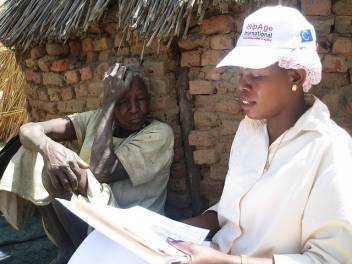 The impact of disasters on ageing societies has already happened in more developed countries, with over two-thirds of the deaths from the 2011 Japan tsunami over the age of 60.
The impact of disasters on ageing societies has already happened in more developed countries, with over two-thirds of the deaths from the 2011 Japan tsunami over the age of 60.
This changing demographic picture is fast becoming a global phenomenon, which reinforces the need for government and humanitarian responses to address older people’s specific vulnerabilities by providing appropriate and accessible emergency health, nutrition and livelihood support.
Lessons from West Darfur
Responses to humanitarian emergencies on the scale of the Darfur crisis often concentrate on meeting immediate basic needs and ensuring the safety of the endangered population. It is well documented that older people, as a vulnerable group, are often neglected or ignored in this initial response. Prolonged violence and displacement present a further challenge to humanitarian agencies, creating longer-term social, economic and psychological needs.
The 2003-2004 Darfur humanitarian emergency has become a prolonged humanitarian crisis, with between 1.65-2 million internally displaced people (IDPs) and a further several hundred thousand Sudanese refugees in neighbouring Chad.
Research by HelpAge International in IDP camps indicates that older people, some 8% of the camp population, have derived little benefit from the international aid effort. This is, in part, the result of many international NGOs’ strong and justified focus on women and children.
Older people’s unrecognised vulnerability is exacerbated by their isolation in IDP camps where they are often separated from their families. In the camps, family structures fragment and older people, especially older men lose their status. They are also often caring for young dependents with little to no support.
In response, we have set up projects focusing on key areas of vulnerability for older people, including health problems, social isolation and lack of intergenerational support. The success of such work depends on cooperation with other INGOs working in similar areas and with vulnerable groups.
To support older people affected by prolonged emergencies, we are building on previous research, best practice and advocacy in four areas:
Ensuring services reach most vulnerable rather than most visible
Health programmes should respond to chronic healthcare issues, not only typical emergency-related problems. This is particularly relevant for older people, who are more vulnerable to chronic conditions, such as diabetes and high blood pressure.
This means building a network of community-based staff and volunteers to support vulnerable older people and provide them with home-based care.
Developing a cross-cutting approach
HelpAge believes that a cross-cutting approach adopted by a larger number of agencies could help mitigate some of the longer-term impacts of conflict.
For agencies addressing the needs of specific groups – children, women and older people – this means adopting a more inclusive approach to programming. It can also mean building stronger programming links between various humanitarian actors.
Starting early; involving older people
Early support for community coping mechanisms and conflict resolution processes could bolster the eventual peace-building role of community members. The potential contribution of older people, who would typically guide community discussions and actions in Darfur, has been largely ignored and their role undermined by their loss of status since the conflict began.
Understanding conflict resolution processes, identifying strategies to involve communities, and supporting the important role older people can play are steps that humanitarian actors should undertake as early as possible if tensions are to be healed.
UNJUST campaign
HelpAge’s new campaign – UNJUST – calls for older people to be better supported in emergencies and encouraged to actively participate during emergency and recovery situations.
In Sudan, our partner and representatives from older people’s associations have already met with the Humanitarian Aid Commission and other humanitarian actors and presented a letter demanding that the rights of older people in emergencies be recognised.
You can also get involved by:
- Finding out more about the UNJUST campaign.
- Following @helpage on Twitter and using the #UNJUST hashtag to spread the word.
- Reading our UNJUST storify to find out how older people took action on the campaign launch day, 20 February.
